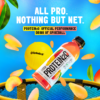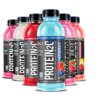CHICAGO — The average consumer has little understanding of protein other than consuming more of it may improve their overall health. The health halo around protein has prompted many food and beverage manufacturers to feature claims on packaging calling out protein content. Ready-to-drink (R-.T-.D.) beverages, in particular, have seen a surge in sales and innovation.
“Beverages are a convenient transport system for important nutrients, especially proteins,” said Lara Niemann, marketing director in the Americas for Gelita U.S.A., Sergeant Bluff, Iowa. “Consumers today demand beverages with appealing flavors and no bitter aftertaste. This requires the proteins to have specific properties. They need to be low in molecular weight for good digestibility, low in viscosity to allow sufficient protein concentration and tasty for ease of consumption.”
Many beverages provide other functional benefits. There are protein beverages to energize, refuel, rehydrate, satiate and more. Some are intended for the sports nutrition market, while others serve as meal replacements. Most are simply beverages with benefits and are targeted to the average consumer who simply wants better-for-you refreshment.
That is the strategy behind the growing category of protein waters. One of the first competitors in the space was BiPro Protein Water from BiPro U.S.A., a business of Agropur Inc., Eden Prairie, Minn. The clear beverage, which comes in berry, lemon and orange flavors, delivers 20 grams of the company’s proprietary whey protein isolate (W.P.I.) in each 16.9-oz bottle. A serving is only 90 calories and void of fat, sugar and carbohydrates.
“We decided to create BiPro Protein Water because of its unique versatility in the R-.T-.D. protein beverage marketplace,” said Polly Olson, vice-president of sales, marketing and new business development. “Not only is this the perfect post-workout drink for a professional athlete, but also the average gym-goer or health-conscious mom.”
The newest flavor, orange, debuted at the end of 2017 and is caffeinated. One bottle contains 100 mg of caffeine, equivalent to an 8-oz cup of coffee.
With protein and caffeine together, it’s a drink designed for busy, health-conscious consumers, Ms. Olson said.
“Protein water is a very new product category, and caffeinated protein water is extremely rare,” she said.
Orange BiPro Protein Water stays true to BiPro’s clean label commitment. The beverage is made with six ingredients. The drink’s caffeine content comes from guarana extract, a natural, plant-based source.
Bringing clarity to the category
Another player in the protein-water space is Chicago-based Protein2O, which offers two product lines. The original line delivers 15 grams of protein from W.P.I. in every 16.9-oz bottle. It contains no added sugars, as it is sweetened with sucralose. The new line is sweetened with cane sugar and stevia. A bottle contains 10 grams of protein and 5 grams of sugar.
“Look down the beverage aisles and it’s easy to see that people are looking for more out of their beverages than just refreshment,” said Sue Wellington, chairwoman of the board of directors at Protein2O and former president of Gatorade.
A key attribute of protein water is clarity. W.P.I., a highly concentrated source of protein at 90%, is one of the few protein ingredients that can deliver. This is not without challenge, as heat processing of W.P.I. dissolved in a clear system may produce cloudiness. An inexpensive way to increase clarity is to allow adequate hydration time of the protein in solution before heat treatment.
Anne Louise Friis, business development manager, Arla Foods Ingredients, Denmark, said there is a lot of activity in the development of clear protein beverages.
“These protein waters are considered more refreshing and easier to drink by many consumers for whom milky drinks are not appealing,” Ms. Friis said. “They can also be packaged easily in cans and plastic bottles with sports caps, which makes them attractive to active consumers.”
Arla has developed a specialized whey protein solution that may be incorporated into a clear R-.T-.D. beverage. It is 100% whey based, contains up to 9% protein content, and is sugar and fat free.
“Enhancing the palatability of protein in R-.T-.D. beverages is a challenge,” Ms. Friis said. “Protein, in general, as a standalone ingredient is not known for its great taste.
“The exception is proteins extracted from milk, such as whey, which have a pleasant taste that makes them acceptable to most consumers. Many plant proteins, by contrast, present taste challenges, which limits their use in beverage products, or necessitates the use of masking agents, which can compromise clean label strategies.”
Bolthouse Farms, a part of C-Fresh, a division of the Campbell Soup Co., Camden, N.J., now offers the Bolthouse Farms B line of products, a platform of lower-sugar, super-premium refrigerated beverages. Each 15.2-oz bottle contains 16 grams of protein (from whey) with 70% less sugar (16 grams total) than the leading refrigerated protein drink, according to the company. Monk fruit juice extract helps reduce sugar content.
The benefits of combining proteins
Many creamy-style beverages often will rely on multiple dairy proteins. This is particularly true of sports nutrition products, as the combination of fast-digesting whey proteins with slow-acting casein proteins is essential for recovery. This is because the combination provides a constant flow of amino acids and the essential nutrients needed to replenish a body and maximize post workout recovery while building and repairing lean muscles.
Gatorade, a PepsiCo, Inc. brand, for example, now offers a line of recovery protein shakes. Each shelf-stable 11.16-oz bottle contains 20 grams of casein and whey proteins.
JoeFroyo, Upland, Calif., is introducing JoeFroyo Functional Cold Brew, which combines the kick of caffeine from cold-brew coffee with probiotics and protein from drinkable yogurt. The beverage is fortified with milk protein isolate and whey in order to deliver 15 grams of casein and whey proteins per 12-oz bottle. The refrigerated drink uses high-pressure processing to extend shelflife.
“The functional beverage market is seeing exponential growth right now, but wherever we looked, we could see drinks that sacrificed taste for benefits or benefits for taste,” said Zach Miller, president and chief executive officer. “With JoeFroyo, we tried to create a functional beverage that checked all the boxes. It’s full of long-lasting energy, natural health benefits and we never compromise on great taste.”
Developing a pleasant mouthfeel is critical when formulating R-.T-.D. protein beverages. No one wants a gritty, chalky drink.
“When formulating R-.T-.D. beverages with higher protein, there are two critical issues that need to be addressed: protein solubility and heat stability,” said Chenchaiah Marella, director of research and development, Idaho Milk Products, Jerome, Idaho. “Not all (dairy proteins) are created equal in that high solubility is not inherent and formulators should seek proteins that offer greater solubility. Otherwise, end products can suffer from undesirable floating particles that affect appearance and mouthfeel negatively.”
Milk proteins, due to the high ratio of micellar casein to whey, offer greater initial heat stability than many other proteins, Mr. Marella said.
“However, heat and pH changes as part of food processing can disturb the packaging of calcium phosphate and allow migration of some micellar calcium from the interior of the casein micelle to the micelle surface,” he said. “This can result in calcium-mediated aggregation of proteins during processing and subsequent storage.”
This equates to decreased shelf life, as the beverage’s viscosity will increase over time. This is perceived by the consumer as being a chalky mouthfeel. Idaho Milk Products addresses this challenge by adjusting the calcium phosphate content to optimize the functionality of milk proteins.
“Removal of free and lightly bound calcium phosphate opens up the structure of the casein micelle, generating significantly improved protein functionality,” Mr. Marella said. “One benefit of the improved functionality is greater solubility, which provides more functional protein per pound of protein. Another benefit is quicker dispersion and hydration. This reduces energy costs and frees up capacity. Depending on process setup, this has the potential for increased plant throughput.”
Greater solubility improves long-term product stability. It also reduces fouling of equipment, which translates to less frequent plant cleanings.
Interest growing in plant proteins
Plant protein ingredient suppliers recognize the opportunities in the beverage segment. Because of sensory limitations, current use of plant proteins is limited by type and amount added. Pea protein is currently one of the most promising options.
“Recognizing that R-.T-.D. beverages vary widely in how they are formulated, processing conditions, levels of protein inclusion, what other ingredients are included in the formulation, sensory requirements, pH levels of the finished product, and the like, we found it necessary to develop a wide range of U.S.-grown, non-G.M.O., organic pea proteins that would work for each of our customer’s particular needs,” said Kushal Chandak, vice-president of research and development, Puris, Minneapolis.
Ingredion Inc., Westchester, Ill., is offering pea protein isolate, a highly concentrated protein produced from a non-allergen yellow pea. Compared with competing plant-based protein solutions, Ingredion’s pea protein isolate offers better emulsification for higher stability, according to the company.
AIDP Inc., City of Industry, Calif., recently introduced pumpkin seed protein. It is a 100% pure, single ingredient powder made from cold-pressed pumpkin seeds. It is 80% protein and shows promise in the beverage category.
“Our pumpkin seed protein is ultra-clean and hypoallergenic,” said Mark Thurston, president. “It has a mild, nutty, almost sweet flavor that is perfect for beverages. It can easily be masked for a smooth taste or complemented with rich flavors, such as peanut butter, caramel or chocolate.”
Pumpkin seed protein is found in new Bear Squeeze, a performance-driven meal shake that delivers 21 grams of protein per single-serve bottle. The product comes as dried powder in a plastic bottle to which a consumer adds water or another liquid, shakes and consumes. Whole algae protein is also part of the protein blend.
With such a growing array of protein ingredients, formulators may want to heed Mr. Chandak’s advice.
“Lean on the expertise of the ingredient manufacturer,” he said. “This seems simple, but so often a formulator relies on their own experience and internal resources rather than reaching out to those who typically know the product the best. We can shorten learning curves and provide novel solutions or even customized proteins, if commercially viable.
“In addition, start with the cleanest-tasting protein available. This also seems straight forward, but it is amazing how often work goes into trying — and failing — to make a bad protein taste better using masking flavors and other techniques in an effort to save a dollar on the front end only to have the product fail in the market because it didn’t meet consumer expectations.
“In the end, as we all know, taste is king. Don’t handicap your product from the start by using an inferior protein.”
Exploring collagen peptides
Collagen peptides may be found in a number of health and wellness beverages, often in conjunction with dairy proteins, as they are animal-derived ingredients. Collagen is the most abundant protein in the body and is a key constituent of all connective tissues. It provides the infrastructure of the musculoskeletal system and is essential for mobility.
“Our collagen peptides are manufactured according to precise enzymatic hydrolysis processes, resulting in unique products with high and consistent quality and stability,” said Lara Niemann, marketing director — Americas, Gelita U.S.A., Sergeant Bluff, Iowa.
They produce clear solutions and are neutral in taste. They may be used with other nutrients to develop beverages with specific properties for particular needs and target groups.
“Studies have shown collagen peptides to effectively support metabolic turnover,” Ms. Niemann said. “They are an ideal source of protein for maintaining the health of the body’s connective tissue, bones, joints, skin, ligaments and tendons.”



